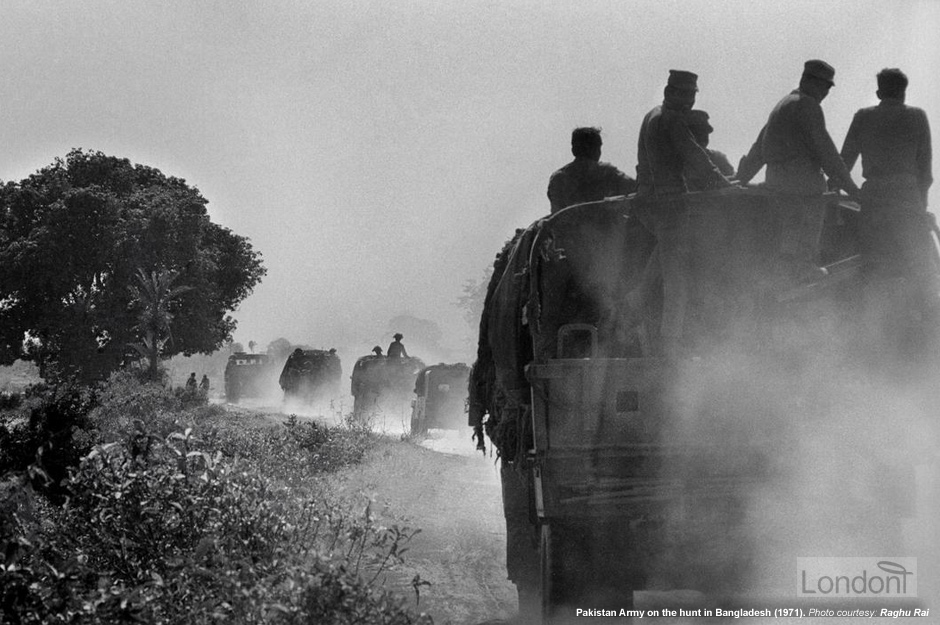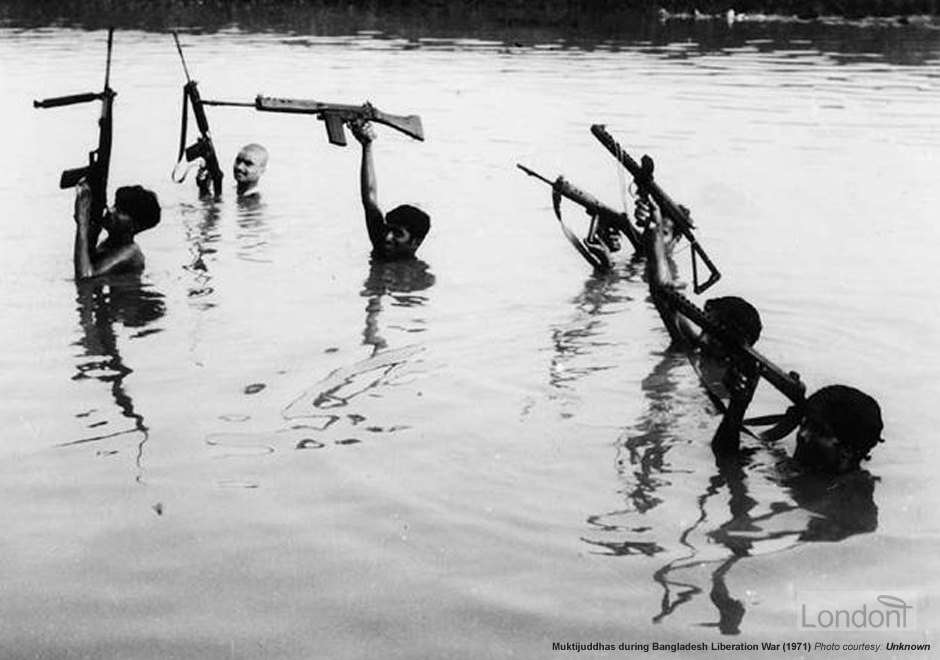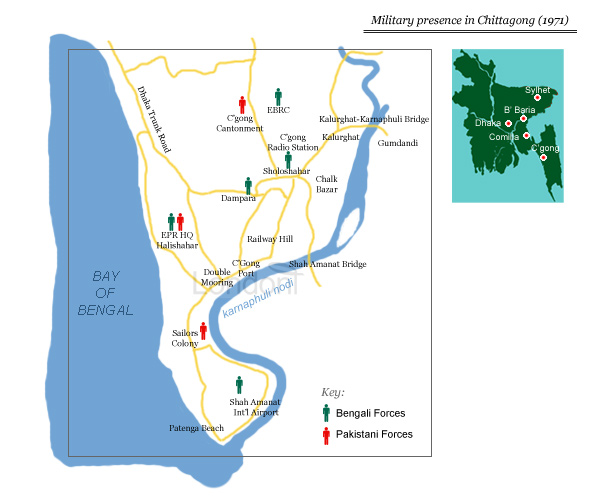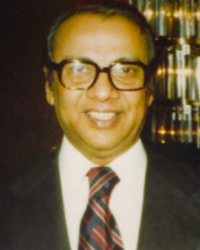
Joydebpur - first mutiny of Bengali forces
Last updated: 5 October 2017 From the section 1971 Muktijuddho
A week before Bangladesh-Pakistan war officially broke out, an incident took place which highlighted the growing tense relationship between eastern and western personnel.
On 19 March 1971, the 2nd East Bengal Regiment (EBR) of the Pakistan army based in Joydebpur (sometime spelt 'Joydevpur') was preparing to receive its brigade commander, Brigadier (later Lieutenant General) Jehanzeb Arbab, a West Pakistani, for lunch.
The 2nd EBR, part of 57 Brigade but comprising mostly Bengali troops and officers - thus fondly nicknamed 'Junior Tigers - was located 20 miles north of Dhaka at the 'rajbari' (royal palace) at Joydebpur. The Commanding Officer (CO) of the regiment was Lieutenant Colonel Masudul Hossain Khan, a Bengali. The real purpose behind Brig. Arbab's liaison visit had been subject to question, and resulted in the first Bengali resistance to Pakistani forces in the year of Swadhinata Juddho.
It was a foretaste of things to come.
Version #1: West Pakistani military come to disarm Bengali EBR officers and attack unarmed civilian
According to the Bengali version of the incident, at 10 am (on 19 March 1971) the unit at Joydebpur was told that the brigade commander was coming to lunch on the pretext of seeing the EBR's conditions and problems and also to visit the Gazipur Ordnance Factory nearby which produced arms, ammunitions and explosives. The commander's visit was widely seen as a move by the soldiers toward preparing for eventual action against the civil disobedience movement.
Meanwhile, the Bengali officers were hugely depleted. Out of a total of 900 troops of the regiment, only 250 were in Joydebpur. Of the four companies, one had been sent to protect the Gazipur Ordnance Factory, two were in Mymensingh on the excuse of 'Indian aggression', leaving only the headquarters company at the rajbari.
For days rumours were bound that there was a plot by West Pakistani officers to disarm the Bengali soldiers and a group were arriving soon to execute the order. This view was also shared by the general public. Thus, on 17 March 1971, two days before the brigade commander's arrival, the local people had erected 50 barricades all the way from Tongi to Joydebpur in the hope of preventing the Pakistani troop from entering it. However, in addition to hindering the West Pakistani troops these barricades also blocked supplies for the Bengali officers and troops. As such Lt. Col. Masud and his second-in-command (2 IC), Major K. M. Shafiullah (another fellow Bengali), spoke with the people about removing the barricades but were unsuccessful. Any taken down by soldiers were put up again elsewhere.
The situation at Gazipur was also tense. Barricades were erected en route and the resident director of the ordnance factory, Brigadier Karimullah, a West Pakistani, was surrounded by the workers. One company of 2nd EBR was sent to Gazipur to collect Brig. Karimullah who had also been invited to attend the lunch at Joydebpur.
At 12 noon 2nd EBR received a message from Brigadier Arbab that he was clearing barricades as he came along, but that they should also clear the road from their side and use 'maximum force' if there was opposition. It took the brigadier quite a while to get to Joydebpur after removing the barricades. He arrived around 1.30 pm "full of pride" with a strong armed contingent consisting of Lt. Col. Zahed, Major Jafar Khan (who had recently replaced Bengali Major Khaled Musharraf as the brigade major), three Captains, and 8-10 vehicles of troops carrying 70 jawans (soldiers).
Lieutenant Colonel Zahed and one of the Captains were gunner officers. Major Jafar Khan was an armour man. Of the remaining two captains one was an infantry officer while the other was a commando. The jawans were armed with 7.62 mm Chinese light machine guns, though these were normal weapon carried by the troops at the time and even Bengali officers had the same weapon.
Sensing the 2nd EBR's readiness to face the prospect of disarmament, Brig. Arbab did not proceed further with their plan other than mere show of force.
Major Shafiullah admitted that he had his men at a high level of readiness with a view to rebelling at the correct moment. He wrote that Brigadier Arbab questioned him about the state of readiness and probably guessed his intentions.
 Jehanzeb Arbab ()
Jehanzeb Arbab ()  Masudul Hossain Khan ()
Masudul Hossain Khan ()  K. M. Shafiullah ()
K. M. Shafiullah ()  Jafar Khan ()
Jafar Khan ()
The visiting group had their lunch at the rajbari as planned. During the meal news arrived that local people had barricaded the road by dragging a goods train bogie on to the railway level crossing. Brigadier Arbab ordered Lt. Col. Masud to remove the barrier, telling him to use 'maximum force' and shoot at people "be-parowa" (indiscriminately) if necessary. Major Moinul Hussain Chowdhury, a Bengali, was sent with his company to the barricade, while Major Shafiullah remained in the palace with the rest of the troops.
 Moinul Hussain Chowdhury ()
Moinul Hussain Chowdhury ()
The railway crossing was surrounded by the Joydebpur bazaar and it was heaving with people as it was a 'haat' (market) day. Even so, thousands more people had gathered at the instigation of the local Awami League representative, Habibullah.
Major Moinul and his officers spent 40 - 45 minutes telling the 50,000 strong crowd that the Bengali troops had not been disarmed, but they listened neither to him nor to Habibullah (who tried to amend for his misunderstanding), and a labour leader who was also present at the spot. They requested the crowd to allow the troops to go through unhindered, but all in vain. The passionate crowd was determined to prevent the West Pakistani military commander and soldiers from returning to Dhaka and collecting arms and ammunitions from the nearby Gazipur Ordnance Factory. After Brig. Arbab arrived he ordered the barricades removed. The crowd became more violent then before. The Brigadier ordered Lt. Col. Masud to open fire, however, he was hesitant to shoot so Brig. Arbab ordered Major Moinul to shoot instead. He was told to take his company and remove the barricades and shoot at sight in the event of any resistance. However, Lt. Col. Masud told Major Moinul to shoot in such a way that the bullets would go 'over the heads or below the feet'. Also the Bengali part of Major Moinul would not allow him to undertake such drastic action against his own people. Thus the Major calmed the situation by joining the crowd and telling them that he was a Bengali just like them. Seeing this, rather than leave the Bengali officers to deal with the situation with tact and patience and avoid potential uprising, Brig. Arbab ordered his own West Pakistani troops to open fire indiscriminately. The Bengali civilians, in turn, responded with fire in self-defence.
As someone fell down after being hit, the crowd began to run away. Nevertheless, the captured Chinese sub-machine gun opened fire from behind the barricade from top of the mosque on Brigadier Arbab who luckily escaped death.
The clash continued for 20 - 30 minutes, after which the crowd dispersed.
The troops fired their machine guns - some people were killed, the rest ran away. Among the dead were two named Manu Miah and Khalifa. It is necessary to mention that the local people were also ready with shotguns, rifles and spears; but how long could these last in the face of heavy machine guns?
Matters were further complicated by the appearance of two Bengali soldiers, a driver and his helper, who informed the brigadier that they had been severely beaten by the crowd, and that 5 of them had been kidnapped and their arms and ammunition snatched. At Brigadier Arbab's order Major Moinul ordered his men to fire but added in Bengali 'fire below' for 'fire over their head'. Allegedly Brigadier Arbab demanded that they 'fire for effect'. The crowd also opened fire. According to Major Shafiullah (who was not present at the scene), 'The Brigadier became wild and shouted "I want one dead body for one bullet. If you cannot handle the situation I will employ my troops"'.
Major Jafar Khan, who served with Brigadier Arbab stated that the Brigadier "led from the front", whilst another West Pakistani officer - who did not serve with Brigadier Arbab in East Pakistan - described him as "merciless".
The hot exchanges resulted in the death of two Bengali civilians and three West Pakistani soldiers being badly wounded. A pro-Awami League newspaper claimed that 20 were killed in the firing.
The barricade was finally removed when the officers themselves physically removed the wagons from the level crossing and the West Pakistani soldiers were forced to retreat to the Dhaka Cantonment.
It was the first armed resistance by the Bengali, and an open rebellion by the Bengali soldiers, against West Pakistani soldiers. All over the country, people were blocking the supply of foods and other materials to the cantonment for the West Pakistani soldiers. The Pakistani military authority issued a stern warning against such actions. However, the Bengalis ignored the warning.
Nūruna Nabī, authors of "Bullets Of '71: A Freedom Fighter's Story" ()
Following the clash, Brigadier Arbab left instructions to put the area under curfew, recover the missing weapons and report ammunition usage and casualty reports of dead and injured to him.
The next day, the curfew was extended to Gazipur.
To the great disappointment of the brigade commander, our report showed 2 dead and a few injured. The brigade commander was not happy. He asked, "Why 63 rounds were fired for only 2 dead?".
Version #2: Bengali mob attack troop after self-created misunderstanding
According to Pakistani version of the event, Brigadier Arbab had visited Joydebpur with a platoon of about 30 troops (not 70) on a routine visit to see his unit. They did not go there to disarm the unit since talks were on in Dhaka at the highest level for a negotiated settlement to the political impasse, with President Yahya himself in town. Had they intended to disarm as the Bengalis propagated then the units in the capital Dhaka would've been disarmed first. The West Pakistani troops would not have travelled 20 miles away from Dhaka to Joydebpur to capture that place first.
By the Bengali officers' own accounts, only one company of the battalion was at Joydebpur. It seems unlikely that a brigade commander would come 20 miles out of the capital to Joydebpur to disarm just this one unit when no other Bengali unit in the capital or elsewhere was being disarmed. Talks were going on at the time in Dhaka between Mujib and the President in the expectation of a political settlement. Lt. Col. Masud says he had 'only' 250 troops in Joydebpur, and that the brigadier came with a large party, heavily armed. But the visiting party had 30 soldiers according to Major Jafar and 70 according to Major Shafiullah, and carried their normal weapons, so either way, the Bengalis far outnumbered and outgunned the visitors. Indeed, Major Shaifullah claims that it was the state of readiness of his troops that made the Brigadier change his mind about disarming them after arriving at Joydebpur! The facts suggest that the brigadier came to inspect the situation and decided that the battalion needed changing after his experience at Joydebpur.
The Bengali crowds were already agitated post Sheikh Mujib's Ebarer Sangram speech on 7 March 1971. The next day, workers in Gazipur Ordnance Factory formed 'Sangram Parishads' (Action or Struggle Committees) - in similar vein to the famous Rashtrobhasha Sangram Parishad during Bhasha Andolon - to work on behalf of the Awami League.
On the morning of 18 March 1971 (i.e. the day before the Brigadier's arrival), nine bus-loads of Bengali workers and officers left for Joydebpur to attend a protest meeting after rumours were circulated by Sangram Parishads that Baluch or Punjabi regiments were going to disarm the Bengali battalion and take over the Gazipur Ordnance Factory. The protestors were going to stop them. They had intended to ask the Bengali CO, Lt. Col. Masud, not to lay down his arms and revolt.
However, later that evening, when Brigadier Karimullah, the resident director of the factory, spoke with Lt. Col. Masud on the wireless after his phone lines had been cut off he was re-assured by the Lieutenant that no such orders (to disarm) had been issued and it was all due to a misunderstanding. It seemed that the Battalion had the old 0.303 rifles and LMGs (Light Machine Guns) with them. They were issued with new Chinese weapons as replacement, and asked to return their old weapons. However, with telephone being tapped everywhere, the locals jumped to the conclusion that since it was a Bengali Battalion, it was being disarmed. Lieutenant Masud was also being dubbed as a Bengali traitor for seeming to agree to lay down the arms when called upon by West Pakistani 'Imperialists'.
To remove the misunderstanding, Lt. Col. Masud called upon local leaders, including Habibullah, to explain the situation and asked the civil police to dispel the rumour, but it was taking time to undo the harm.
On the day of the clash, thousands of provoked locals arrived at the bazaar with spears, bamboo sticks, and few with shotguns, 0.22 and other calibre rifles ready for action. The 'excited crowd' would not listen and obstructed their pathway by pushing a goods train across the level crossing. When the troops were pushing the wagon to one side, the 'mob opened fire' forcing the East Bengal Regiment to fire back in self-defence. Thus, according to the Pakistani version, it was the police who were the innocent party and the Bengali crowds were the agitators (and not vice-versa).
When the party got back to base in Dhaka there was much excitement, as for the first time the brigade commander had been attacked while visiting one of his own units.
That night Brigadier Karimullah slept with his M-16 rifle under his bed and a 0.25 pistol under his pillow.

Chittagong - military hub of East Pakistan
Chittagong was the second most important city in East Pakistan after Dhaka. It housed the only oil refinery in East Pakistan, had a large fuel depot, was the largest seaport and MV Swat, with 9,000 tons of arms and ammunition was in port. Bengali units substantially outnumbered the West Pakistani Chittagong garrison, which was a cause of concern for Pakistani planners.
The Chittagong cantonment is located to the north of the city, while the Naval base was near the airport on the south end of the city. The port facilities are positioned between the airport and the naval base.
The East Bengal Regimental Center (EBRC) which provided training to new recruits, was located next to the Chittagong Cantonment. It was Commanded by West Pakistani Lt. Col. Shigri and housed 2,000 Bengali troops, including the newly raised 9th EBR.
The 8th East Bengal Regiment (EBR) was located at Sholashahar, the heart of the city. It was Commanded by Lieutenanat Colonel Abdur Rashid Janjua, a Punjabi.
The East Pakistan Rifles (EPR) was in Halishahar, south-west of the cantonment, and commanded by Pakistani officer Lt. Col. Abdul Aziz Sheikh. EPR contained three wings: 11th (with 5 companies), 14th (4 companies) and 17th (4 companies) commanded by Major Muhammad Iqbal (West Pakistani), Major Shamsuddin Ahmed (Bengali) and Major Peer Mohammad (West Pakistani). A company from each of the three wings were located in the Halishahar headquarter which also housed 600 Bengali and 300 Pakistani troops. Other wing companies were deployed throughout the Chittagong division, for example, in Ramgarh, Taindong and Sajek (14th Wing), Kaptai and Rangamati (17th Wing), Cox's Bazar, Teknaf, Barkal and Maislong (11th Wing).
An EPR platoon, composed mainly of Bengalis, were also present at the Chittagong Airport (now called Shah Amanat International Airport) located to the south most of the city. The platoon was tasked with guarding the airport.
The port area around the southern border of the city was commanded by Brigadier Mohammad Hussain Ansari, a West Pakistani. A company of Bengali troops were deployed to unload ammunitions from MV Swat. In addition, Pakistani navy ship PNS Jahangir, a destroyer, and the gunboat PNS Rajshahi and PNS Balaghat was also present in Chittagong.
There were only a few Bengali officers at the Embarkation Headquarters in Lal Khan Bazaar which was commanded by a Bengali officer Captain Muslim Uddin.
The Army Transit Camp in Double Mooring was under the command of a non-Bengali officer, although the majority of soldiers in the camp were Bengalis.

 Fatemi ()
Fatemi ()  Mohammad Hussain Ansari ()
Mohammad Hussain Ansari ()  Abdur Rashid Janjua ()
Abdur Rashid Janjua ()  R. A. Mumtaz ()
R. A. Mumtaz ()  Shigri ()
Shigri ()  Abdul Aziz Sheikh ()
Abdul Aziz Sheikh ()  Muhammad Iqbal ()
Muhammad Iqbal ()  Shamsuddin Ahmed ()
Shamsuddin Ahmed ()  Peer Mohammad ()
Peer Mohammad ()  Muslim Uddin ()
Muslim Uddin ()
Captain Rafiqul Islam foresees upcoming Pakistani onslaught and responds
During the war of independence members of the EPR were the first to respond against Pakistan Army.
On 23 March 1971, Bengali Major (later Brigadier General) Shamsuddin Ahmed, commanding officer of 14 Wing of EPR - the only Bengali officer to command a troop in EPR - was ordered by Lt. Col. Aziz to visit his border troops at Ramgarh as he had "not done so for the last two months". So like a true professional Major Shamsuddin left early next morning by jeep accompanied by his wife and small kids. Unknown to him, as he was "aloof from politics as I am today", this was only an excuse to remove him and pave away for other hidden agenda which became apparent the next day.
On 23 March 1971 there was a lunch at EBRC Officers Mess in honor of [Pakistani] General Hamid who had come to visit Chittagong to warn the non-Bengali elements of the armed forces in the area of the impending storm gathering at the horizon and threatening to strike at midnight of 25 March 1971 which I could guess much later only after the storm had stuck. Being a truly professional and loyal army officer for a Bengali was being stupid as I understood it later. As it is, for me it was just a formal lunch like many a such lunch and dinner I had attended before. At one stage of the lunch, my sector commander [Pakistani] Colonel Aziz called me aside and asked me to leave the following morning for the border area of my command ostensibly to visit my troops which he reminded me I had not done for the last two months because of IS duty preoccupation at the Headquarters in the city. As I guessed later I was perhaps sent to the border as part of a plan to disarm and kill all Bengali troops of EPR at the Headquarters at Halishahar which the Sector Commander possibly thought would be easier in my absence. Well they could kill me without sending me to the border. May be Providence had desired something else.
In the afternoon of 25 March 1971, Dr. Zafar, a prominent Awami League leader and ophthalmologist (eye specialist) in Chittagong, met Captain Rafiqul Islam, the EPR Sector Adjutant. They discussed possible strategies to put up a resistance in the city in the event of a Pakistani onslaught. They met again in the evening after Dr. Zafar was informed from Dhaka that President Yahya had sneaked away and Pakistani troops were about to stage a crackdown on innocent civilians in the capital.
They had a closed-door meeting in the house of M. R. Siddiqui, President of Chittagong District Awami League and Member of National Assembly, which was attended by other leading party members. Captain Rafiq phoned one of his confidantes in the EPR headquarter in Halishahar and asked him to pass on the message to all 300 Bengali soldiers and officers - most of whom were Non-Commissioned Officers (NCO) and Junior Commissioned Officers (JCO) - to revolt and capture the Pakistani soldiers dead or alive. Captain Rafiq also requested Dr. Zafar to get in touch with Lt. Col. M. R. Chowdhury and Major Ziaur Rahman to ensure that all Bengali soldiers and officers in the East Bengal Regimental Centre and in Sholoshahar revolted and joined the resistance.
I told Dr. Zafar, I along with my troops of EPR will fight the Pakistan Army to save our people and to free them. Move to Sholashahar and the Cantonment and tell all Bengali soldiers to join us. Meet me at my tactical HQ on the Railway Hill. Immediately, I dialled Halishahar EPR HQ where the Bengali JCOs were waiting my orders.
 Rafiqul Islam ()
Rafiqul Islam ()  Zafar ()
Zafar ()  M. R. (Mustafizur Rahman) Siddiqui ()
M. R. (Mustafizur Rahman) Siddiqui ()
Captain Rafiq arrived in the Halishahar EPR headquarters at about 10 pm and found that all three arms depots were under the control of Bengali soldiers. Few Bengali were killed, including Major Amirul Islam, the Sector medical officer. Afterward Bengali soldiers belonging to the EPR left behind their border-posts and began to move towards Chittagong before the night was over.
Captain Rafiqul Islam's presence in the headquarters inspired the Bengali officers to capture all non-Bengali soldiers of the East Pakistan Rifles. Captain Rafiq's actions on the day and evening of 25 March 1971 are a good example of civil-military relationship. The valiant army officer did not act unilaterally; rather, he had discussed all possible ways of facing the enemy with the political leaders. The Captain could understand that without organizing the Bengali soldiers and officers of the EPR and EBR, it would not be possible to stop the atrocities of the invading Pakistani military, and hundreds of thousands of innocent lives would be lost.
Captain Rafiq had also met Major Ziaur Rahman who used to live in the Nasirabad Housing Society in Sholashahar area. He asked the senior officer to join him and the other soldiers of EPR and EBRC to revolt against the Pakistani oppression. Major Zia gave no firm answer.
Major Ziaur Rahman gave no commitment to Captain Rafiq who repeatedly insisted that if troops of the 8th East Bengal regiment could be sent to the cantonment lives of many Bengali soldiers, officers and their family members would be saved. Later a few young officers of the 8th Bengal Regiment disclosed that it would have been suicidal on their part to attack the Chittagong cantonment with only 200 men armed with 303 rifles.
However, almost simultaneously, the events at East Bengal Regiment were also about to take a dramatic turn.
On 28 March 1971, Pakistani Brigadier Iqbal Shafi, commander of 53 Infantry Brigade, arrived with a column composed of 24 Frontier Force and 88 Mortar battery from Comilla to relieve pressure on 20 Baluch. The EPR led by Captain Rafiqul Islam ambushed them at Kumira, 15 miles north of Chittagong. This was the first direct action against the enemy in the Bangladesh Liberation War.
During Muktijuddho, Captain Rafiqul Islam was promoted to Major and became commander of Sector 1 (Chittagong) in June 1971 replacing Ziaur Rahman who left to command Sector 11 (Mymensingh-Tangail).
EPR troops in Chittagong under Major Rafiqul Islam mounted pre-emptive attacks on key points across the city, thwarting Pakistani efforts to take control of East Bengal's main port. But their success was mixed and brief. Soon battle ensued as Pakistani forces began hunting for Zia and his men. 8th EBR and EPR units would fight several engagements, losing men and material, and be forced steadily to move towards the Indian border, setting a pattern.
